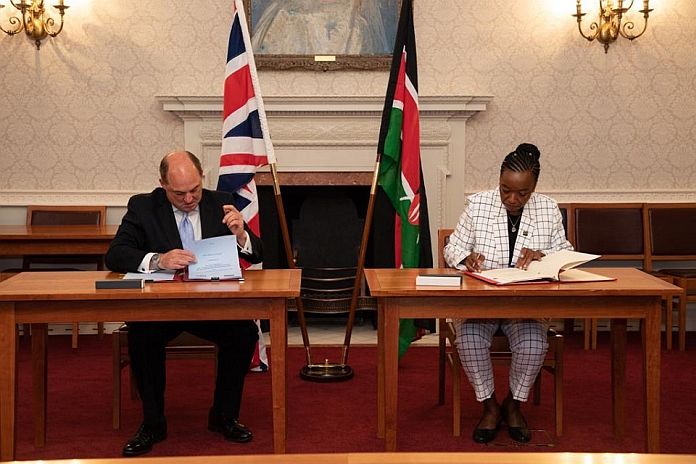LONDON, England – Kenya and the UK have signed a new five-year Defence Cooperation Agreement in a side event during president Kenyatta’s three-day guest of government visit to the UK.
The Cabinet secretary for defence, Dr Monica Juma, and her UK counterpart, defence secretary Ben Wallace, signed the new DCA July 27, at the ministry of defence offices in London. This agreement will anchor the defence priorities between the two nations over the next five years.
Our two nations have a long and proud history of military cooperation, working together on land, sea and air to find shared solutions to our shared challenges, including countering the threat from terrorists groups like Al-Shabaab. The signing of the DCA comes six months after the two defence secretaries met in Nairobi, agreeing a refreshed security compact to deepen wider stability and security cooperation, part of the Kenya-UK strategic partnership. The new DCA, once ratified by the Kenyan and UK Parliaments, will allow our militaries to share expertise, experience and techniques, making both forces more effective.
Speaking at the signing event, the UK’s defence secretary, Wallace, said: “It was great to meet Dr Monica Juma again today. We held very fruitful discussions and agreed a range of measures to keep both of our countries safer. Kenya has long been our defence partner of choice in East Africa and, in a more uncertain world, we will continue to stand shoulder-to-shoulder as we tackle the threats of tomorrow.”
Kenya’s Cabinet secretary for defence, Dr Juma, said: “Today, Ben Wallace and I reaffirmed our commitment to continue deepening the defence cooperation between our two nations. The framework underpinning this strategic relationship is the Defence Cooperation Agreement which has become an invaluable tool for enhancing the competencies of our defence forces. Overall our cooperation continues to significantly improve the ability of our forces to operate effectively in high-threat environments.”
The current DCA has had many successes over the past five years of military cooperation. Under the agreement, the UK has provided an annual training of over 1,100 KDF soldiers, with courses in the UK, or with UK military training teams in Kenya. Further training has also been provided through the UK-funded Counter-IED Wing at the Humanitarian Peace Support School (HPSS) in Embakasi. Since its opening in 2016, over 2,000 military and police from 22 countries have been trained in CIED skills and 40 CIED instructors developed, significantly improving the ability of African Union (AU) forces to operate effectively in high-threat environments, including against Al Shabaab.
The UK has also provided extensive support to infrastructure projects at the KDF’s School of Infantry, which include an urban village, a Forward Operating Base (FOB), and an assault course, all which prepare more than 600 KDF personnel for deployment in the African Union Mission in Somalia (AMISOM). The UK has been supporting AMISOM Troop Contributing Countries since 2010, through the Short Term Training Teams (STTTs) from the British Army, which costs KES43M annually.
The presence of the British Army Training Unit Kenya (BATUK) has had significant benefits for the local economy and community. It has contributed over KES 5.8 billion to the economies of Laikipia, Samburu and Isiolo. More than 550 local staff have maintained their jobs even during the harshest economic times brought in by the COVID-19 pandemic. Meanwhile, our community engagement projects have not only improved education, health and environmental protection but have pivoted support towards COVID containment. At the onset of the pandemic, BATUK provided 443,000 litres of water across the three counties and also helped in food distribution.
Last month (June 2021), we handed over a multipurpose training facility to the Kenyan Navy with firefighting equipment alongside the Danish government. The facility will also be available to other maritime agencies to conduct their firefighting and sea survival training, which is essential for deployment at sea. This will go a long way in helping the Kenyan Navy progress towards becoming a centre of excellence in maritime safety.





